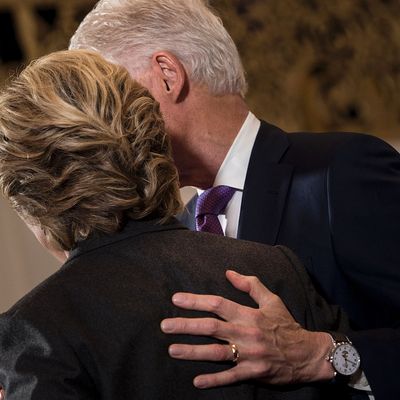
As most observers begin to grow weary with the many, many theories of how and why Hillary Clinton lost a presidential election virtually everyone thought she had well in hand, a fresh theory has arisen that will sound painfully familiar to people close to the defeated candidate: Her husband may have helped do her in, just as he allegedly did in 2008.
In HRC’s first presidential race, Bill Clinton went on something of a public bender of race-tinged recriminations toward Barack Obama at a very inauspicious point in the presidential-nominating contest. It’s a stretch to blame that for the ultimate outcome, but it was a distraction the campaign did not need, and led a lot of Clinton-watchers to wonder how she’d “keep Bill under control” in 2016.
In point of fact the 42nd President was notably less prominent in HRC’s campaign the second time around. But as a long investigative piece from the Washington Post’s Sari Horwitz suggests, he may have inadvertently set off a chain of events that led to the damaging late intervention in the campaign by FBI director James Comey, whose out-of-the-blue October 28 letter to Republican congressional leaders disclosing a new investigation of Hillary Clinton’s emails (and perhaps even his subsequent announcement the new emails did not change anything) are widely thought to have given Trump the break he needed to pull off an upset.
As Horwitz explains, Attorney General Loretta Lynch knew about the pending Comey letter and could have (indeed, should have) had it quashed. She reportedly did not do so because of assurances she made of a hands-off attitude towards the case after a June encounter with Bill Clinton on a Phoenix tarmac that became very public. In Horwitz’s telling, the attorney general was completely blindsided that day:
It was a sweltering June day in Phoenix, and Lynch’s plane had just landed at the airport. She and four staffers had flown west for a series of meetings with local police officers.
The staffers walked down the plane stairs first and stepped into a van on the tarmac. The plan was for Lynch — and her husband, who was also on the trip — to follow quickly afterward and step into another vehicle. As the staffers waited for about five minutes in the van, checking their smartphones, they suddenly saw a man with silvery white hair approaching the plane.
The half-hour of small talk (or so the participants said) that ensued between Lynch and WJC became the smoking gun in Republican conspiracy theories about alleged political interference with the FBI investigation into HRC’s emails. And so Lynch was loath to stand in Comey’s way, even when he was violating the standard procedure of avoiding pre-election drama with his note to Congress about the emails he needed to examine from Anthony Weiner’s laptop. By then, the die had already been cast:
Justice officials decided that neither Lynch nor her deputy, Yates, should order Comey to not send the letter. They weren’t sure how Comey would respond to such a command. And they too feared leaks. Lynch and her advisers were nervous about how it would look if people found out that she, a Democratic presidential appointee, told Comey to keep secret from Congress a new development in the Clinton investigation.
We’ll never know for sure what Lynch might have done with the email case and Comey’s handling of it had she not been compromised by the tarmac encounter. But having been compromised, she knew any late effort to rein in Comey would look even more political than what the FBI director was doing, and draw even more attention to an incident that did not belong in headline news less than two weeks before the election. So by any kind of “but for” test, Bill Clinton’s “courtesy call” on Lynch’s plane in Phoenix may well have altered history in ways he could not have envisioned but should have feared.
And so the long tangled story of Bill and Hillary Clinton’s immensely productive but sometimes star-crossed partnership takes another unexpected turn, as her ambitions of reentering the White House as chief executive vanish forever.






























